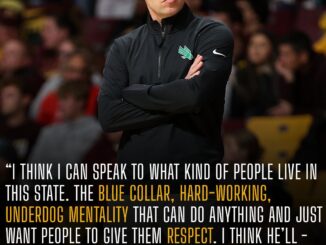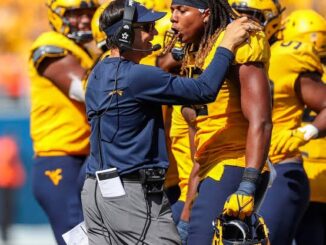
West Virginia head coach Rich Rodriguez spoke to the media after the team’s 12th spring football practice, providing updates on the team’s progress and key takeaways from their scrimmage.
Rodriguez noted that the team ran about 90 plays in their scrimmage, emphasizing the need for more internal competition. While he isn’t dissatisfied with the roster, he believes some positions may need external additions to create the necessary competition.
Addressing the offensive line, Rodriguez acknowledged the challenge coaches face in developing the unit. None of the offensive linemen have played yet, and while they are working hard and making progress, he’s unsure if they have enough depth or competition at the position.
The scrimmage was intended to increase competitiveness, and Rodriguez will review the film to evaluate their progress. He mentioned a few players he was particularly interested in seeing take the next step.
Rodriguez emphasized honesty with players, ensuring they understand their standing within the team. The coaching staff conducts “truth run” meetings to provide feedback, which isn’t always negative but is meant to help players improve.
When selecting a starting quarterback, Rodriguez prioritizes execution and playmaking over personality. He believes leadership should emerge naturally and be earned over time. The team scheduled their final spring practice for April 5 to allow time for individual meetings. From April 7 onward, players will receive evaluations and, if necessary, be advised on entering the transfer portal. Some of these discussions will be difficult, as certain players are performing well but may not have a place on the final roster.
The team must trim the roster to 105 players by July. During the summer, full-team practices with the ball are restricted, but individual skill work is allowed. The coaches will have some opportunities to work with players in June, but conditioning remains a significant factor as the team is still far from game-ready.
Rodriguez has no issue with players working with private quarterback coaches in the offseason, as long as their training aligns with the team’s offensive system. He pointed out that timing in a shotgun offense differs from other systems, so external coaches must adapt their training accordingly.
With access to advanced video technology, the staff is compiling film of every player’s drills, highlighting both strengths and weaknesses. Coaches will review these clips with players to provide feedback and determine depth chart placements.
Rodriguez expressed appreciation for all his players but emphasized the need for them to be good enough to win. Some freshmen have a long way to go, though a few show potential for standout careers.
Reflecting on his time at Jacksonville State last year, Rodriguez recalled that he had 60 players in camp but saw inconsistencies between early practices and in-season performance. He’s learning from that experience to ensure a stronger start at West Virginia.
Lastly, he noted that while transfer portal players often require development, the program can’t afford to wait on 25 freshmen to progress as they did in the past.



Be the first to comment